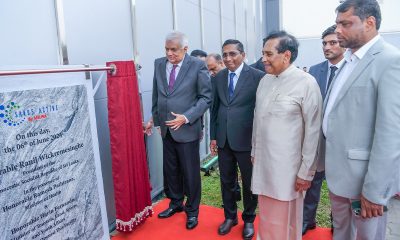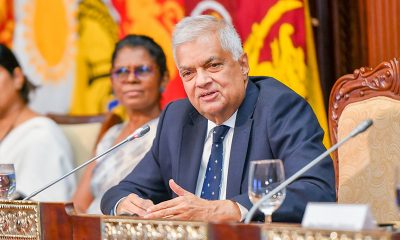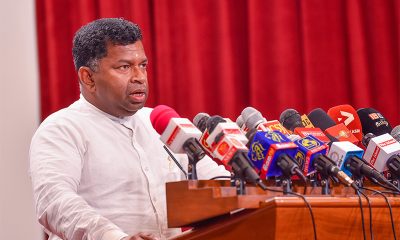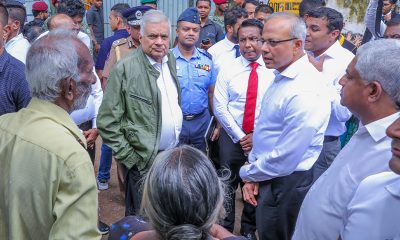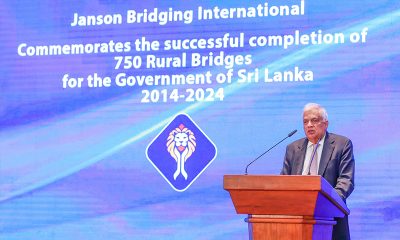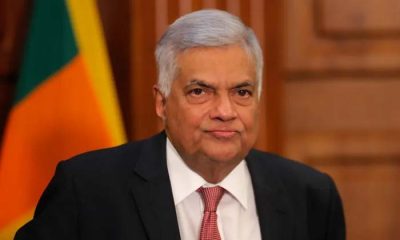News
G-77 summit: President RW calls for earmarking 1% of GDP for R&D over a decade
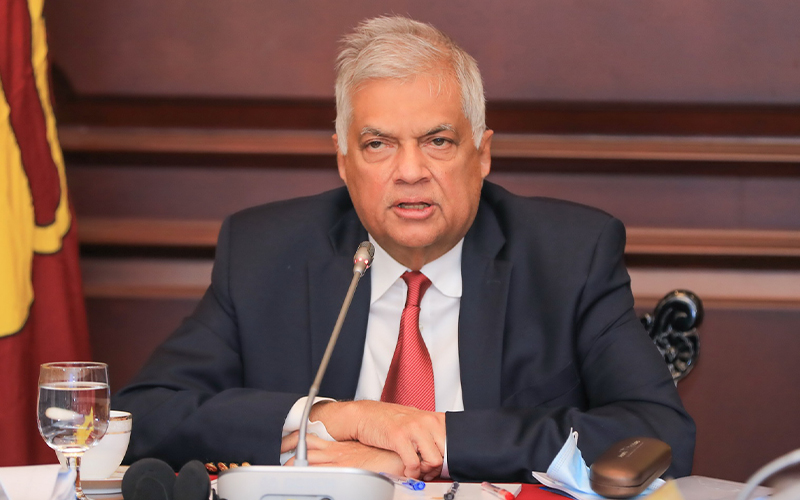
President Ranil Wickremesinghe, in his speech at the Summit of the Heads of State and Government of the G77 and China in Havana, Cuba, on Friday, emphasised the crucial role science, technology and innovation play in overcoming the current development challenges faced by developing nations worldwide.
President Wickremesinghe began his speech by commending Cuban President Miguel Diaz-Canel Bermudez for convening the Summit and acknowledging Cuba’s historic role as a champion of the aspirations of developing nations at various multilateral forums.
Wickremesinghe noted the unprecedented challenges confronting the global South, including the pandemic, climate change, food, fertiliser and energy crises, which threaten the achievement of Sustainable Development Goals (SDGs) and exacerbate the global debt crisis.
President Wickremesinghe delved into the historical perspective of technological development, highlighting how Europe’s advancements in the 15th century, such as gunpowder, cannon and ocean-going ships had enabled it to conquer other parts of the world, resulting in the technological divide seen today. He underscored that a new technological divide is
emerging in the 21st century, necessitating the adoption of digitalisation and new technologies such as Big Data, IoT, AI, Blockchain, Biotechnology and genome sequencing to bridge the gap.The President emphasised the importance of an educated labour force well equipped with knowledge and technological know-how essential for the smooth flow of the much-needed transformation of the developing nations.
The President outlined his government’s initiatives including the evaluation of underperforming Science and Technology Research Institutes and the establishment of a Technology and Innovation Council and a Digital Transformation Agency. Additionally, Sri Lanka plans to create four new universities specializing in new technologies, with one being the result of technological cooperation between India and Sri Lanka. The International Climate University will be the 05th.
Addressing the digital divide, President Wickremesinghe cited challenges such as limited access to costly technology, insufficient digital skills and infrastructure, cultural and institutional barriers and financing constraints. He called for effective cooperation mechanisms within the G77 and China, including the revitalization of the Consortium of Science & Technology & Innovation for the South (COSTIS) and the commitment of member countries to earmark 1% of their GDP for R&D over a decade.
President Wickremesinghe stressed the importance of collaboration between governments and the private sector and proposed creating technological platforms in fields like digitalization, health, medication, AI and renewable energy including green hydrogen, inspired by the European Union’s Technology & Innovation Platforms.
The brain drain from the South to the North and the resulting loss of educated manpower is another threat to the development of Science Technology and Innovation of the South, President Wickremesinghe said, adding that China, India, Japan and South Korea have developed Science Technology and Innovation by nurturing their manpower. “Therefore, we must ask for compensation from the North for the loss of our manpower,” he added.
He also urged increased South-South cooperation and proposed a scheme akin to the Colombo Plan to enhance collaboration, exchange best practices and develop policies that harness the transformational potential of science, technology and innovation.
In conclusion, President Wickremesinghe reaffirmed Sri Lanka’s commitment to supporting the new Havana Declaration and called for the collective voice of G77 and China to be heard in international fora.The President’s address underscored the significance of science, technology and innovation in shaping the future of developing nations, making it a pivotal moment at the G77 and China Summit.
News
US sports envoys to Lanka to champion youth development

The U.S. Embassy in Colombo welcomed the U.S. Sports Envoys to Sri Lanka, former National Basketball Association (NBA) and Women’s National Basketball Association (WNBA) players Stephen Howard and Astou Ndiaye, from June 8 through 14.
The Public Diplomacy section of the U.S. Embassy said that it would launch a weeklong basketball program intended to harness the unifying power of sports, made possible through collaboration with Foundation of Goodness and IImpact Hoop Lab.
While in Sri Lanka, Howard and Ndiaye, both retired professional basketball players, will conduct a weeklong program, Hoops for Hope: Bridging Borders through Basketball. The Sports Envoys will lead basketball clinics and exhibition matches and engage in leadership sessions in Colombo and Southern Province for youth aged 14-18 from Northern, Uva, Eastern and Western Provinces, offering skills and leadership training both on and off the court. The U.S. Envoys will also share their expertise with the Sri Lanka Basketball Federation, national coaches, and players, furthering the development of basketball in the country. Beyond the clinics, they will collaborate with Sri Lankan schoolchildren to take part in a community service project in the Colombo area.
“We are so proud to welcome Stephen and Astou as our Sports Envoys to Sri Lanka, to build on the strong people-to-people connections between the United States and Sri Lanka,” said U.S. Ambassador Julie Chung. “The lessons that will be shared by our Sports Envoys – communication, teamwork, resilience, inclusion, and conflict resolution – are essential for leadership development, community building, equality, and peace. The U.S. Sports Envoy program is a testament to our belief that sports can be a powerful tool in promoting peace and unity.”
News
Rahuman questions sudden cancellation of leave of CEB employees

SJB Colombo District MP Mujibur Rahuman in parliament demanded to know from the government the reasons for CEB suspending the leave of all its employees until further notice from Thursday.
MP Rahuman said that the CEB has got an acting General Manager anew and the latter yesterday morning issued a circular suspending leave of all CEB employees with immediate effect until further notice.
“We demand that Minister Kanchana Wijesekera should explain this to the House. This circular was issued while this debate on the new Electricity Amendment Bill was pending. There are many who oppose this Bill. The Minister must tell parliament the reason for the urge to cancel the leave of CEB employees,” the MP said.However, Speaker Mahinda Yapa Abeywardena prevented Minister Wijesekera responding to the query and said that the matter raised by MP Rahuman was not relevant.
News
CIPM successfully concludes 8th Annual Symposium

The Chartered Institute of Personnel Management (CIPM) successfully concluded the 8th Annual CIPM Symposium, which took place on 31st May 2024. Themed “Nurturing the Human Element—Redefining HRM in a Rapidly Changing World,” the symposium underscored the pivotal role of human resource management (HRM) in today’s dynamic global landscape. Since its inception in 1959, CIPM has been dedicated to advancing the HR profession through education, professional development, and advocacy, solidifying its position as Sri Lanka’s leading professional body for HRM.
Ken Vijayakumar, the President of the CIPM, graced the occasion as the chief guest. The symposium commenced with the welcome address by the Chairperson, Prof. Arosha Adikaram, followed by the Web Launch of the Symposium Proceedings and Abstract Book by the CIPM President. The event featured distinguished addresses, including a speech by Chief Guest Ken Vijayakumar, President of CIPM, and an address by Guest of Honor Shakthi Ranatunga, Chief Operating Officer of MAS Holdings Pvt. Ltd., Sri Lanka.
The symposium also featured an inspiring keynote address by Prof. Mario Fernando, Professor of Management and Director of the Centre for Cross Cultural Management (CCCM) at the University of Wollongong, Australia.
Vote of Thanks of the inauguration session was delivered by Dr. Dillanjani Weeratunga, Symposium Co-chair.
The symposium served as a comprehensive platform for researchers to present their findings across a wide range of critical topics in HRM. These included Cultural Diversity and Inclusion, Talent Development and Retention, Ethical Leadership and Corporate Social Responsibility, Adapting to Technological Advancements, Mental Health and Well-being at Work, Global Workforce Challenges, Employee Empowerment, and Reskilling and Upskilling.
The plenary session was led by Prof. Wasantha Rajapakse. Certificates were awarded to the best paper presenters during the valedictory session, followed by a vote of thanks delivered by Kamani Perera, Manager of Research and Development.
The annual symposium of CIPM was a truly inclusive event, attracting a diverse audience that spanned undergraduates, graduates, working professionals, research scholars and lecturers. This widespread interest highlights the symposium’s significance in the field of HRM, offering a unique opportunity for everyone to network and learn from scholarly brains.The CIPM International Research Symposium was sponsored by Hambantota International Port, Sri Lanka Institute of Information Technology (SLIIT), E B Creasy & Co. PLC, and Print Xcel Company.


